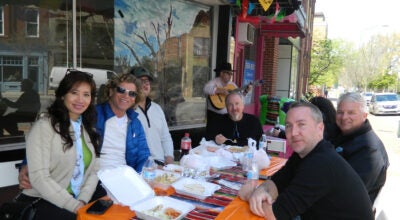Visiting musician reflects on history of music style in North Carolina
Published 12:00 am Monday, August 27, 2012
GOLD HILL — Pat Walker Johnson and Kay Starnes positioned their lawn chairs under a shade tree Saturday afternoon, and nothing could have been more appropriate.
Bluegrass music is like a big family tree.
The women found out they were “related” back in 2006, when Johnson, living in Roswell, Ga., read the newspaper obituary for Cranford “Chubby” Starnes.
It mentioned how Starnes had played bluegrass music with Don Walker and his Blue Ridge Boys in North Carolina. Walker was Pat’s late father.
On a whim, Pat Johnson went to Chubby Starnes’ funeral, where she met Chubby’s daughter, Kay, for the first time.
They never knew it, but there they were, children of N.C. bluegrass pioneers, living 6 miles apart in Roswell, Ga.
They have been friends ever since.
So why did Johnson and Starnes travel to Gold Hill Saturday for the Ralph Pennington Memorial Bluegrass Reunion? They did it for the music, of course, and to visit with another “sister,” Vivian Pennington Hopkins, the face of bluegrass music and history in Gold Hill.
Hopkins’ late father, Ralph, a well-known musician and fiddle-maker, just happened to play with Don Walker, too, back in the early 1940s.
As a kid, Johnson remembers all these bluegrass musicians, including legends such as Earl Scruggs and Jim Shumate, jamming at her house.
“It’s just amazing how all these things tied together,” Johnson said.
Small world
Bluegrass can make it a small world, connecting musicians and their families from the past with today’s generation, who as Starnes and Hopkins will tell you, like to keep the music alive by playing, besides documenting its history.
In a way, that was the theme to John Santa’s presentation Saturday, kicking off the day of music at Gold Hill Mines Historic Park.
What goes around, comes around.
For the past six months, Santa, of Chapel Hill, has been serving as one of 70 “Road Scholars” for the N.C. Humanities Council.
Santa’s talk focuses on the culture of bluegrass music in North Carolina — how it evolved from the plantations, took separate journeys with blues and old-time country music and was melded into a distinct new sound, particularly by Bill Monroe and his Blue Grass Boys from Kentucky.
Hence the name, “bluegrass.”
Santa is author of the book, “Bluegrass Is My Second Language: A Year in the Life of an Accidental Bluegrass Musician.”
Getting into it ‘accidentally’
He was introduced to bluegrass “accidentally” in 2001.
“This is all my lawyer’s fault,” he laughed Saturday while selling some of his books and CDs.
His lawyer and her husband invited Santa to a gourmet dinner at their house one evening. The attorney also wanted Santa to meet her brother, Bill Yarborough, a bluegrass musician from Asheville, that same night.
Santa and his bands had always focused on Southern rock ‘n’ roll and the blues, and he characterized his meeting with Yarborough “the ultimate blind date” musically.
“In this case, he was phenomenal,” Santa added.
Soon, Santa was running out to his car for his cello and other instruments, loving the sound the men were able to produce.
From that meeting, Santa was introduced to other bluegrass musicians — a step into the world that would have taken three to five years by normal means, he said.
His bluegrass book is a lot about life, Santa explained, and saying “yes” to the opportunities that present themselves.
For him, bluegrass was one of those things. Today he’s making music with the band EightTwentythree, whose bluegrass album, “The Blessing of the Strings,” includes 17 songs produced and arranged by Santa.
They serve as a musical accompaniment, if you will, to his book.
“I had to have a copy,” Hopkins said Saturday.
History of NCmusicians
North Carolina can take great pride and even assume some bragging rights into the roots and development of the music that would become popularized by Monroe as “bluegrass,” Santa said.
The colonists who settled North Carolina — the English, Scots and Irish — had a classical bent to their music played on instruments such as the piano, harpsichord and cello.
African slaves heard this music coming from “the big house” for the first time. It was different from their own music, which had Middle East influences, and distinct bending, sliding notes on fretless instruments such as banjos.
Each group became interested in the other’s music. “That’s what musicians do,” Santa said, and it became a way to communicate better and the “first crack” of sorts toward eventual integration.
The stature of slaves rose, in fact, if they were musicians, Santa said. African-Americans were introduced to the guitar, while whites learned about the banjo.
Some up-tempo evolutions began musically, and the blues and old-time music developed, with different regional sounds, out of the 19th century.
Innovations, Santa said, happened deliberately or by accident, such as playing the frets on a guitar with the top of a wine bottle.
Bluegrass also benefited because Bill Monroe, born in 1911, was the youngest boy in his family. The only instrument left for him to play was a mandolin.
“Imagine where we would be now if he had been the third born and picked out the guitar,” Santa said.
Fusion of styles
Monroe found a way to infuse the old-time music and his fiery mandolin with blues. He always gave part of the credit to Arnold Schultz, a black country blues player (fiddle and guitar) from Rosine, Ky.
Add in influences such as N.C. native Earl Scruggs’ banjo, Lester Flatt’s guitar and Jim Shumate’s fiddle, and music history was changed forever.
One major hole in bluegrass history involves women, Santa said. Their roles in the music were hardly ever documented, “but that doesn’t mean they weren’t there,” he said.
During Santa’s presentation Saturday, he often illustrated some of his points by playing several of his instruments.
When he fielded some questions from the Gold Hill audience, Kay Starnes mentioned from under her shade tree that Hickory’s own Shumate was the man who introduced Scruggs to Bill Monroe.
Starnes’ father, Chubby (also known as Roscoe Rainmore, the “Old Maid’s Heart Throb”) played bass with Fiddlin’ Jim Shumate and his band, the Sons of the Carolinas.
Shumate formed that band in Hickory, returning home after stints with Bill Monroe, Flatt & Scruggs and the Foggy Mountain Boys.
As you might have guessed, Pat Johnson’s father, Don Walker, established the Sons of the Carolinas with Shumate and played with Starnes, too, in that group.
So there were the daughters of Walker and Starnes Saturday in Gold Hill, sitting under a big, shady tree.
The family tree of bluegrass.
Contact Mark Wineka at 704-797-4263, or mwineka@ salisburypost.com.



